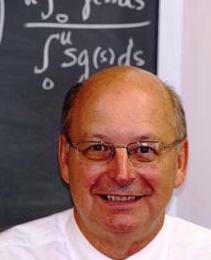Research Support
Grant: #IAS-DMS-9900969-NCE2 Investigators:Groetsch, Charles 09-01-1999 -08-31-2003 National Science Foundation High School Mathematics Teacher Program Role:PI $13,974.00 Closed Level:Federal
Grant: #OSP00191 Investigators:Groetsch, Charles 06-01-2000 -05-31-2001 Department of Education Number and Form: A History-Based Discovery Course for Middle School Teachers Role:PI $9,000.00 Closed Level:Federal
Grant: #DUE-9652834-001 Investigators:Groetsch, Charles 03-01-1997 -02-28-2002 National Science Foundation Inverse Problems: A Curricular Resource for the First Two Years of Mathematical Sciences Role:PI $64,037.00 Closed Level:Federal
Grant: #OBR 8-14 Investigators:Groetsch, Charles 09-21-1998 -12-31-1999 Department of Education Reshaping the Teaching of Geometry in the New Millenium Role:PI $37,344.00 Closed Level:Federal
Honors and Awards
McMicken Award for Distinguished Scholarship, University of Cincinnati; Fellow of the Graduate School, University of Cincinnati; George Pólya Award, Mathematical Association of America, 1994; Faculty Achievement Award, University of Cincinnati, 1994; Presidential Citation, for “Advancing the application of mathematics to science and industry”, Society for Industrial and Applied Mathematics, 1995; Decanal Citation, Universidad Nacional de Colombia, Sede Medellin, “por la importante contribcion academica a traves del cursillo ‘Problemas Inversos y Teoria de Operadores’”, 1998.; Two special issues (Vol. 22, Nos. 2,3, 2010) of the Journal of Integral Equations and Applications dedicated by the Editors and authors to Charles Groetsch in recognition of “high regard for his contributions to the world of mathematics” and his “fundamental contributions to the field of inverse problems.”; Elected Fellow of the American Association for the Advancement of Science (AAAS), 2010, in recognition of “distinguished contributions of the application of mathematics to science, particularly in the areas of inverse or ill-posed problems, approximation theory, and mathematical modeling.” (2011 AAAS Citation)
